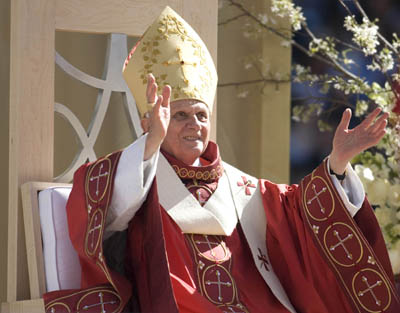
Pope Benedict XVI, shown here celebrating Mass in Washington in 2008, is one of the few popes who is also a theologian and prolific writer. For use with RNS-POPE-WRITER, transmitted March 15, 2011. Religion News Service photo by Tyrone Turner.
VATICAN CITY (RNS) Any book with an initial printing of 1.2 million copies in eight languages qualifies as a global publishing event, regardless of its author. But the release last week (March 10) of Pope Benedict XVI’s latest tome was especially remarkable.
More to the point, “Jesus of Nazareth — Holy Week,” is the latest work of Joseph Ratzinger. For it is the pope’s original name that appears atop the cover and title page of this book, the second in a projected trilogy on the life and teachings of Jesus.
The name is there to make clear that the work is not an official decree from the leader of the Roman Catholic Church, but an expression of one scholar’s ideas.
That distinction is one that makes Benedict’s reign unique.
“Pope Benedict XVI is the first full-fledged theologian to occupy the papacy, and he is the first to write in his own name in addition to (issuing) encyclicals and other papal decrees,” said the Rev. Richard P. McBrien, a theologian at the University of Notre Dame and author of “Lives of the Popes.”
Benedict’s predecessor, Pope John Paul II, came to office with a distinguished background as a philosopher, but the four books he published during his 26-year papacy were memoirs and interviews, not theological studies.
The man who was to become Pope Benedict XVI was already an internationally renowned scholar, with 23 books to his name, before his election. He decided to continue his theological writing with the “Jesus of Nazareth” project, which he had begun two years earlier.
Benedict-Ratzinger’s double identity as a pontiff and private theologian has raised questions over its impact on his papacy and church.
Opinion differs over whether a pope should publish works outside of the papacy’s traditional teaching authority, said Tracey Rowland, dean of the John Paul II Institute in Melbourne, Australia, and author of “Ratzinger’s Faith.”
“Some people argue that it confuses the lay faithful who don’t know what they have to believe and what is a matter over which they might be free to disagree,” Rowland said. Nonetheless, most Catholics are intelligent enough to tell the difference, she added.
In the first volume of “Jesus of Nazareth,” published in 2007, Benedict emphasized that “this book is in no way an exercise of the magisterium” but merely an expression of his personal views, and that “everyone is free, then, to contradict me.”
Benedict’s accomplishments as a writer and thinker are an asset in that they make him a “capable apologist” for his faith in a secular age, said Rupert Shortt, the religion editor of the Times Literary Supplement and author of “Benedict XVI: Commander of the Faith.”
“It’s good that there’s someone in the Vatican to make Christianity credible and intellectually respectable,” Shortt said.
On the other hand, Shortt said, Ratzinger’s long academic background and relative paucity of pastoral experience isolated him from a wider range of opinion within the church, helping to explain the future pope’s “hard-line” positions on such issues as ecumenism and sexual ethics during his two decades as head of the Vatican’s doctrinal office.
Today, Benedict’s hefty intellectual reputation helps shield him from criticism by dissident theologians, said the Rev. Joseph Fessio, head of Ignatius Press, the pope’s English-language publisher.
The dissidents cannot say, “`Oh, the pope doesn’t understand theology, and we know the truth here,”‘ Fessio said. “It’s pretty hard to have a second magisterium when the first magisterium is also a theologian.”
Yet Benedict’s background as an academic who expresses complex ideas in a condensed style of writing makes him less than perfectly suited to the 21st-century world of sound-bite communications.
The drawbacks to Benedict’s approach became evident after his 2006 speech in Germany, in which he quoted a medieval Christian emperor describing the teachings of Islam’s Prophet Muhammad as “evil and inhuman” and “spread by the sword.”
Benedict later confessed that he gave the speech, which provoked the first crisis of his reign, “without realizing that people don’t read papal lectures as academic presentations, but as political statements.”
In a book-length interview with a German journalist last year, Benedict made a subtle statement about the morality of condom use that would have been unremarkable from a professor at a seminar table, but which coming from the pope provoked widespread confusion over possible changes to Catholic teaching on the subject.
Fessio, who studied under Ratzinger at the University of Regensburg in the 1970s, says that such misunderstandings are an inevitable but justified side effect of his former teacher’s determination to engage in “serious reflection.”
“If people don’t have ears to hear, that’s a problem,” Fessio said. “But you can’t express Christology on Twitter.”




